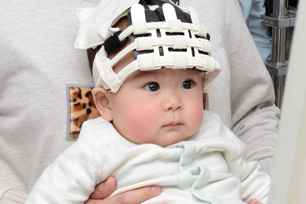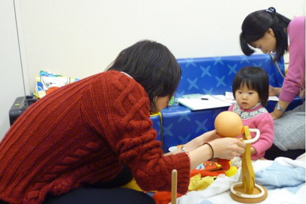Yasuyo Minagawa, Associate Professor, Faculty of Letters, Department of Psychology
Baby Laboratory
Research and education that connects and expands

At the Keio University Baby Laboratory (Lab), which is located in the South Annex on Mita Campus, I am, together with students and researchers, conducting research on social cognitive and linguistic development of infants from the perspective of psychology and neuroscience. Today, in collaboration with other faculties at Keio and outside companies, our research has expanded to include toddlers to adolescents .
Within the first year after birth, infants learn the sonic features of their mother tongue in various ways and develop their language fundamentals. For example, in Japanese, there are five vowels and different stresses (such as the difference in hashi meaning “bridge” and hashi meaning “chopstick”), and infants extract such phonetic features through interpersonal interaction and develop brain network specialized for these features. We conduct research on the developmental process of this brain function using a non-invasive brain function imaging methods (that uses safe light) such as near-infrared spectroscopy and electroencephalogram.
Vocal learning actually starts in fetal life, and in order to investigate the brain function that has just gone through this period, we are also conducting joint research with the Department of Pediatrics of the School of Medicine to study newborn infants. So far, we have clarified that intonation and prosody are processed mainly in the right side of the brain from the time of birth and that newborn babies strengthen their brain binding in the speech areas of the front and back of the left side of the brain when they hear their mothers’ voice.

These findings are not only meaningful from an academic standpoint, but could also be applied when dealing with developmental disorders. For example, in order to verify the effectiveness of a treatment of a disorder or to use as a reference for early identification of a disorder, evaluation based on brain response or binding of brain function may be effective. Last year, Associate Professor Kenji Suzuki of the University of Tsukuba and Professor Junichi Yamamoto of Keio University spearheaded a project on developmental disabilities funded by the Japan Science and Technology Agency (JST) .
The Baby Lab was established about 10 years ago when the Faculty of Letters launched its 21st Century COE Program which was funded by the Ministry of Education, Culture, Sports, Science and Technology. Having been selected to that program, our research environment improved, as well as the research capacities of students and the quality of research at Keio, and it led to being selected for the Global COE Program and obtaining major financial support from JST. Aiming to capitalize on the positive cycle of education and research and to apply it to the Top Global University Project, we are now moving forward to establish a center for life-long developmental research at the Psychology Laboratory on Hiyoshi Campus in collaboration with the School of Medicine and the Faculty of Science and Technology, with a view to expanding the subjects of our developmental research to include young children all the way up to the elderly to contribute to research on longevity.
*Position titles, etc., are those at the time of publishing.
